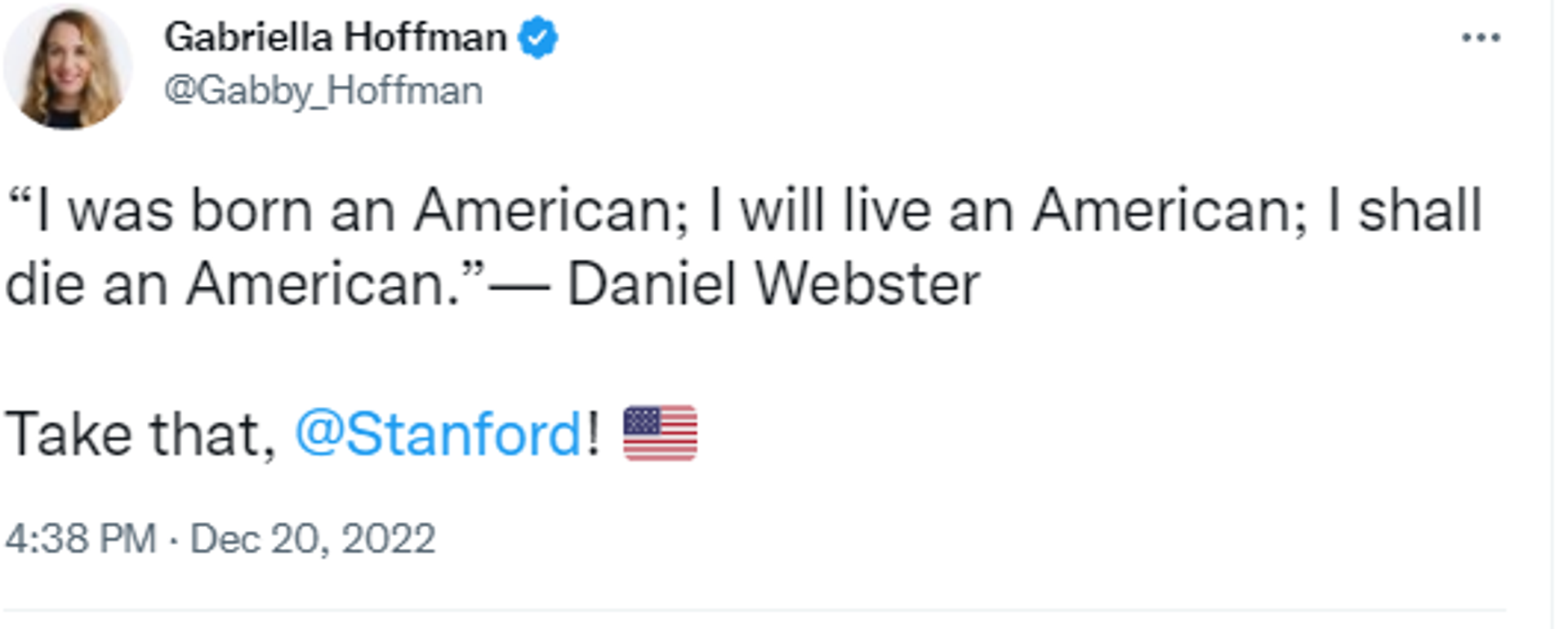https://sputnikglobe.com/20221221/stanford-locks-its-harmful-language-guide-amid-backlash-over-call-to-ditch-term-american-1105662791.html
Stanford Locks Its ‘Harmful Language’ Guide Amid Backlash Over Call to Ditch Term ‘American’
Stanford Locks Its ‘Harmful Language’ Guide Amid Backlash Over Call to Ditch Term ‘American’
Sputnik International
Stanford University locked its ‘Harmful Language’ guide under a password amid backlash.
2022-12-21T09:41+0000
2022-12-21T09:41+0000
2025-04-07T11:05+0000
stanford university
guide
racial slurs
gender issue
ageism
colonialism
american
viral news
https://cdn1.img.sputnikglobe.com/img/07e6/0c/15/1105663327_0:156:3001:1844_1920x0_80_0_0_6de4f1f01ad72e365cd57481e76fe703.jpg
Stanford University website stashed away its "harmful language" guide behind a password after social media backlash following its publication on December 19. The Elimination of Harmful Language Initiative (EHLI) - a “multi-phase” project of Stanford’s IT leaders - was apparently the result of months of effort to dredge up words and phrases that should be expunged from its "website and computer code." Stanford had come up with 10 categories of "harmful language" sections: ableist, ageism, colonialism, culturally appropriative, gender-based, imprecise language, institutionalized racism, person-first, violent and additional considerations.The guide immediately drew critisism, with many singling out the section titled “Imprecise Language,” which advises replacing the term “American” with “US citizen.”“[‘American’] often refers to people from the United States only, thereby insinuating that the US is the most important country in the Americas,” the guide argued, emphasizing that 42 countries between North and South America were included in the region.“Immigrant” also found itself in the section of "harmful" words, with the guide recommending using “person who has immigrated” instead. "Mastering" a subject at the University was also frowned upon, as, “historically, masters enslaved people.” A “masked study” was the preferred option to "blind study", as it “unintentionally perpetuates that disability is somehow abnormal or negative, furthering an ableist culture.” Use of “walk-in hours” was to be traded for “open hours” to include those with disabilities.When it comes to gender issues, the new "woke speak" guide suggested scrapping words like mankind and landlord/landlady, as using “gender binary language that doesn’t include everyone.” Instead of referring to an individual as ‘he’ or ‘she,’ it was advocated that the person’s name or the word “they” be opted for.Even the common phrase “beating a dead horse” was blackmarked as ostensibly being based on normalizing violence against animals.One of those who railed against the guide, media strategist Gabriella Hoffman, went on Twitter to say that the prestigious university’s cofounder, Leland Stanford, "would be ashamed of the institution.”In response to the backlash, a spokesperson for Stanford University told media that "Stanford’s style guidelines are meant for internal use.”Furthermore, Steve Gallagher, Stanford's chief information officer, said that the website did not reflect university policy, saying:Gallagher also conceded that the team had "missed the mark" regarding the listing of the term "American.""We have particularly heard concerns about the guide’s treatment of the term "American." We understand and appreciate those concerns. To be very clear, not only is the use of the term ‘American' not banned at Stanford, it is absolutely welcomed. The intent of this particular entry on the EHLI website was to provide perspective on how the term may be imprecise in some specific uses, and to show that in some cases the alternate term "US citizen" may be more precise and appropriate.”
https://sputnikglobe.com/20221127/moms-for-liberty-ride-wave-of-support-for-non-woke-agenda-vow-to-unify-educate--empower-1104752952.html
Sputnik International
feedback@sputniknews.com
+74956456601
MIA „Rossiya Segodnya“
2022
News
en_EN
Sputnik International
feedback@sputniknews.com
+74956456601
MIA „Rossiya Segodnya“
Sputnik International
feedback@sputniknews.com
+74956456601
MIA „Rossiya Segodnya“
harmful language, guide, stanford university, woke speak, culturally appropriative, ableist, ageism, colonialism, gender-based, imprecise language, institutionalized racism, person-first, violent and additional considerations.
harmful language, guide, stanford university, woke speak, culturally appropriative, ableist, ageism, colonialism, gender-based, imprecise language, institutionalized racism, person-first, violent and additional considerations.
Stanford Locks Its ‘Harmful Language’ Guide Amid Backlash Over Call to Ditch Term ‘American’
09:41 GMT 21.12.2022 (Updated: 11:05 GMT 07.04.2025) In May, Stanford University announced its Elimination of Harmful Language Initiative, part of a multi-year and multi-phase project to weed out and ditch from the school’s websites and computer code words deemed "racist, violent, and biased."
Stanford University website stashed away its "harmful language" guide behind a password after social media backlash following its publication on December 19.
The Elimination of Harmful Language Initiative (EHLI) - a “multi-phase” project of Stanford’s IT leaders - was apparently the result of months of effort to dredge up words and phrases that should be expunged from its "website and computer code."
Stanford had come up with
10 categories of "harmful language" sections:
ableist, ageism, colonialism, culturally appropriative, gender-based, imprecise language, institutionalized racism, person-first, violent and additional considerations.The guide immediately drew critisism, with many singling out the section titled “Imprecise Language,” which advises replacing the term “American” with “US citizen.”
“[‘American’] often refers to people from the United States only, thereby insinuating that the US is the most important country in the Americas,” the guide argued, emphasizing that 42 countries between North and South America were included in the region.
“Immigrant” also found itself in the section of "harmful" words, with the guide recommending using “person who has immigrated” instead. "Mastering" a subject at the University was also frowned upon, as, “historically, masters enslaved people.”
A “masked study” was the preferred option to "blind study", as it “unintentionally perpetuates that disability is somehow abnormal or negative, furthering an ableist culture.” Use of “walk-in hours” was to be traded for “open hours” to include those with disabilities.
When it comes to
gender issues, the new
"woke speak" guide suggested scrapping words like mankind and landlord/landlady, as using “gender binary language that doesn’t include everyone.” Instead of referring to an individual as ‘he’ or ‘she,’ it was advocated that the person’s name or the word “they” be opted for.
Even the common phrase “beating a dead horse” was blackmarked as ostensibly being based on normalizing violence against animals.
One of those who railed against the guide, media strategist Gabriella Hoffman, went on Twitter to say that the prestigious university’s cofounder, Leland Stanford, "would be ashamed of the institution.”

27 November 2022, 12:44 GMT
In response to the backlash, a spokesperson for Stanford University told media that "Stanford’s style guidelines are meant for internal use.”
Furthermore, Steve Gallagher, Stanford's chief information officer, said that the website did not reflect university policy, saying:
"It also does not represent mandates or requirements. The website was created by, and intended for discussion within, the IT community at Stanford. It provides 'suggested alternatives' for various terms, and reasons why those terms could be problematic in certain uses. Its aspiration, and the reason for its development, is to support an inclusive community."
Gallagher also conceded that the team had "missed the mark" regarding the listing of the term "American."
"We have particularly heard concerns about the guide’s treatment of the term "American." We understand and appreciate those concerns. To be very clear, not only is the use of the term ‘American' not banned at Stanford, it is absolutely welcomed. The intent of this particular entry on the EHLI website was to provide perspective on how the term may be imprecise in some specific uses, and to show that in some cases the alternate term "US citizen" may be more precise and appropriate.”



